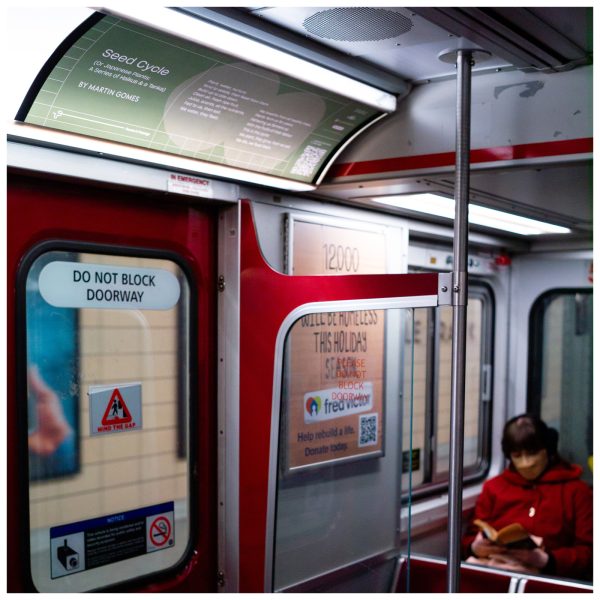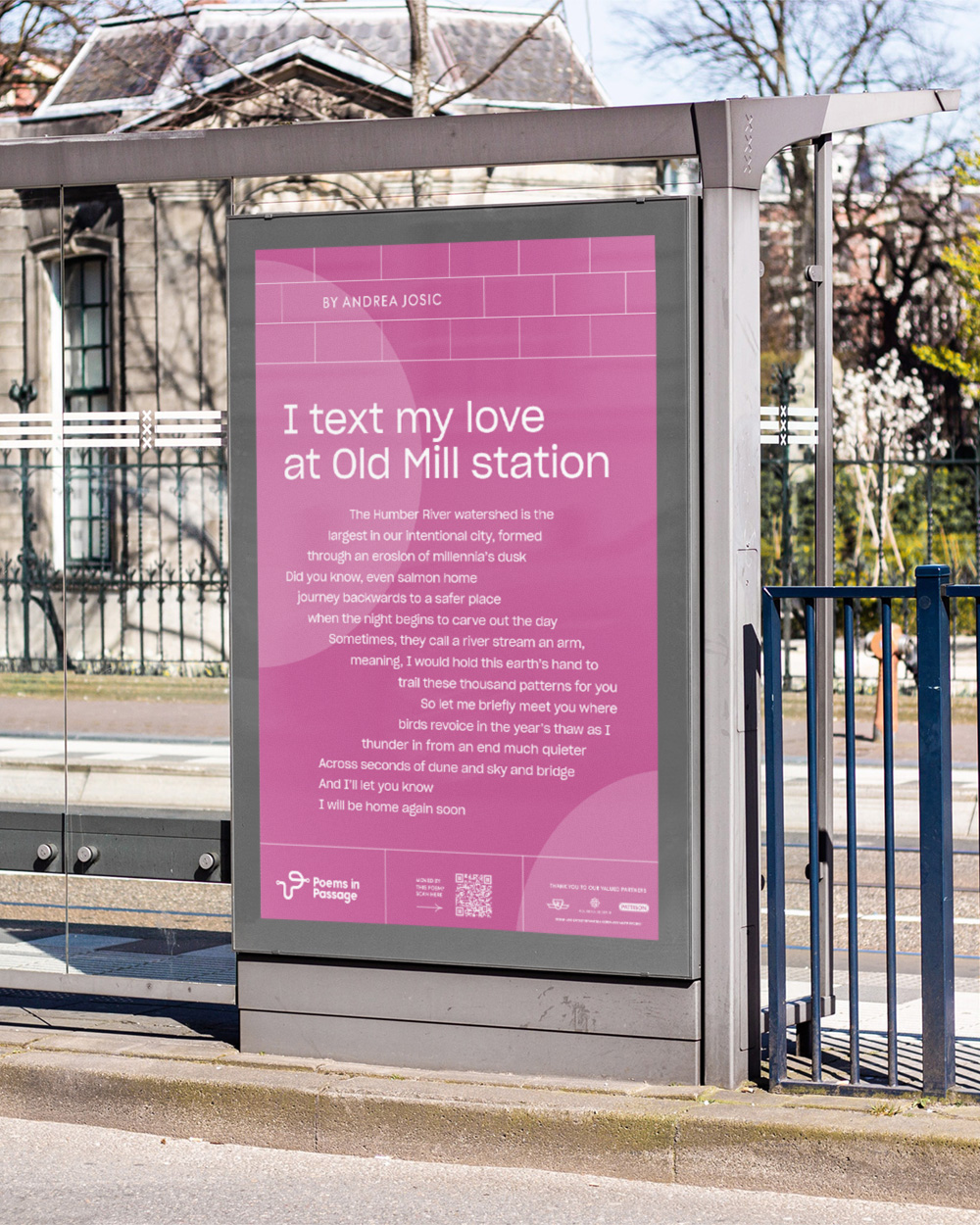The Toronto Transit Commission (TTC) is more than just a means to a destination, it is also a shared space where passengers from all walks of life come onto trains and buses together. Poems in Passage, a public art initiative that brings diverse poetry to TTC commuters, aims to revive a long-lost tradition while creating open spaces of reflection, inspiration, and artistic expression for anyone and everyone. Reviving the spirit of Poetry on the Way, which closed down in 2012 after 14 years of operation, this initiative breathes new life into Toronto’s public transit system by showcasing diverse poetic voices across the city’s subways, stations, streetcars, and buses.
A Nostalgic Spark: The Origins of Poems in Passage
The idea took root in the summer of 2023, when the program’s co-founders, Latif Murji and Addesse Haile, were reminiscing about growing up in Scarborough and seeing poetry on the TTC. Murji is a practicing physician, University of Toronto lecturer, and healthcare non-profit founder, and Haile, formerly with the United Nations Development Program, is now a consultant at McKinsey & Company. As they recall the impact “Poetry on the Way” had on both of them, Murji notes that “Addesse could still recite one of the poems.”
They thought the TTC felt more dreary in the absence of poetry on the walls, especially in the wake of the Covid-19 pandemic, and wondered if the program was still in operation. They discovered in a 2012 Toronto Star article that the program had been discontinued when the organizer had stopped applying for funding. “I turned to Latif and said, ‘Why don’t we try to reignite poetry on the TTC?’” Haile recounts. Murji’s response? “Okay, sure – how are you going to do that?”
Murji cold-emailed both the TTC and Pattison Outdoor Advertising, which handles all of the advertising/postering for the TTC. To his surprise, both organizations were immediately on board.
Beyond simply bringing poetry back to transit, Murji and Haile saw an opportunity to expand its reach. “We wanted to make it more than just poems on a wall,” Murji explains. “By using QR codes, partnering with institutions, and co-hosting poetry slams, we’re creating a public art project that extends beyond transit into community spaces.”
A New Vision for Public Poetry
Poems in Passage aims to make poetry more accessible, inclusive, and playful while reflecting the diversity of Toronto. “We worked with top-tier Toronto-based designers to create a visual language that feels like transit,” Murji says. “From font legibility to tile patterns, every detail ties into public transportation.”
Equally important is the diversity of poetic forms and languages. “We didn’t just want classic sonnets – we wanted spoken word, lyrics, ghazals, Persian poetry, and unstructured verse,” Murji explains. “We also incorporated Mohawk, Arabic, and Farsi texts alongside English translations. Seeing something like Arabic poetry in public spaces is rare, and when people engage with it, it fosters understanding.”
The fleeting nature of a subway ride means passengers don’t have time to read long passages, making poetry an ideal form of artistic engagement. “In just a few lines, poetry can shift someone’s mood, spark a thought, or make them feel seen,” Muriji says. “That’s why this matters.” He adds, “William Wordsworth once said, ‘Poetry is the right words in the right order.’ That’s exactly why it works on the TTC. It’s short, powerful, and resonates instantly.”
Poems in Passage operates on an open-call basis to ensure a fair and high-quality selection. “We don’t pressure anyone,” Murji says. “If artists want to submit, the opportunity is there.” A panel of judges, including Margaret Atwood and other literary experts, reviews the submissions to ensure that the final selections reflect both artistic excellence and Toronto’s cultural diversity.
Murji’s own background teaching and researching the intersection between mental health and public arts at the University of Toronto has helped inform the initiative’s approach to representation. “I work closely with Indigenous communities and understand the importance of cultural humility,” he explains. “This is about letting communities tell their own stories.”
Voices of the Program: Jesse June and Britta B
Jesse June is a featured poet in Poems in Passage and a political science, public law, and creative writing student at the University of Toronto Scarborough. For June, this has been a surreal experience. “It hasn’t hit me yet,” he reflects, noting how seeing his work displayed in public spaces feels bizarre.
As a TTC commuter himself, he feels that the program brings poetry into unexpected moments of daily life, in a space that is communal and public. He believes that this will transform the way people engage with poetry. “Unlike books or spoken word, this initiative is uniquely communal. Everyone on the train or bus is heading to different destinations, but they get to share in this moving experience of seeing poetry exposed.” He emphasizes that poetry in this context allows for a moment of connection: “You might not define your relationship with poetry moving forward, but in that moment, you feel understood.”
His poem, “Tomorrow, Always,” inspired by his journey as a recent immigrant from Nigeria, captures the city’s unique blend of beauty and strangeness. “It’s easy to feel lost here,” he explains. “But the city isn’t so big that you can’t find your way back.” He reflects on moments he’s witnessed on the transit system, like a couple playfully wrestling on the train, encapsulating the tender chaos of urban life. “That’s the city – loud, fast, but also homely and strange. I wanted to give thanks to that.” This poem is displayed in subway trains on Lines 1 and 2.
Britta B is another poet who is part of the cohort whose work is featured in the subway, which she describes as both exciting and humbling. Not only that, she is also the poet in residence of the program, which is a role Murji and Haile offered after watching her trajectory as a poet and performer for the past decade.
Britta B also works as a voiceover talent, public speaker, and teacher at OCAD and Seneca College. “As mentor and professor, I feel that it is within my duty to share the opportunity for folks who are looking to have a bit of guidance in writing and performance,” she says. Sitting on the panel of Poems in Passage, her involvement includes filtering submissions, mentoring emerging poets, and helping shape the creative vision for the project’s future. Britta has also hosted poetry slams where winners earn a spot in the next cohort. “We want to make sure the poems selected are world-class while also reflecting the city’s rich cultural landscape,” she explains.
With an overwhelming number of submissions – 1,000 in the latest call – selecting just 15 poems is a daunting task. “It’s tough because so many people want their work on the TTC, but space and printing costs are limited,” she says. “Every year, this project will grow. More people will connect with poetry, and poetry will connect more people.”
She is curious about how people will respond to each poem. “Will they interpret it differently than I intended? Will it spark them to create their own poetry?” Britta sees public poetry as a counterbalance to urban life. “We’re constantly bombarded by ads trying to take something from us – our money, our attention,” she says. “Public art, especially poetry, gives something instead. It offers a moment of pause, a space to reflect without demands.”
Poetry, she believes, is an experience rather than just words on a page. “People sometimes feel intimidated by poetry because they think they need to ‘get it.’ But poetry isn’t about solving a puzzle – it’s about what it makes you feel,” she explains. “It changes your rhythm, your temperature. It connects you to something intangible – maybe even something in your future you don’t know yet.”
Looking Ahead: A Future Beyond the TTC
Despite its success, Poems in Passage faces the challenge of securing sustainable funding as a non-profit initiative. “Right now, we rely on support from the TTC, the Aga Khan Museum, and Pattison,” Murji says. “But there’s no guarantee that funding will continue.”
To address this, Poems in Passage has launched sponsorship opportunities on its website. “We’re hopeful that companies and organizations will step up,” Murji says. “This is a program that enriches the city – it deserves to last.” Beyond transit, Haile and Murji envision expanding into parks, libraries, and cultural institutions. “Public art should be everywhere,” Haile says. “Poetry has the power to beautify a city and bring people together.”
Future plans also include seasonal themes and features on up-and-coming songwriters and lyricists. “Music and lyrics are poetry too,” Murji says. “We’re exploring ways to bring more forms of poetic expression into the project. Poetry is about connection – connecting to emotions, to the intangible, even to ancestry.”
With Poems in Passage, Toronto’s transit system is once again a rolling page – one that invites passengers to pause, reflect, and feel something unexpected.




